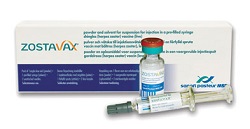 Merck's ($MRK) Zostavax is the only vaccine available for shingles, but people who are at highest risk for the painful viral infection, such as individuals with immunosuppressive disorders like HIV, are not able to receive the vaccine because of safety issues.
Merck's ($MRK) Zostavax is the only vaccine available for shingles, but people who are at highest risk for the painful viral infection, such as individuals with immunosuppressive disorders like HIV, are not able to receive the vaccine because of safety issues.
A new study, published in the British Medical Journal, suggests the need for alternative prevention efforts for these people. The findings also show that many common medical conditions are associated with an increased risk of shingles--including rheumatoid arthritis, inflammatory bowel disease and asthma, underscoring a greater need for vaccination among these individuals.
Researchers looked at data from more than 144,000 U.K. adults diagnosed with shingles between 2000 and 2011, and compared them to adults without shingles. They found that people with rheumatoid arthritis, chronic obstructive pulmonary disease, or inflammatory bowel disease were 30% to 50% more likely to have a shingles diagnosis than people without these conditions. Asthma, chronic kidney disease, Type 1 diabetes and depression were also associated with a greater risk for shingles, but the increase is smaller. Patients with HIV were 5 times more likely to develop shingles compared to individuals without HIV.
Like others vaccines, Zostavax cannot be administered to people who are severely immunocompromised, such as individuals with HIV, leukemia and lymphoma, because of a heightened risk of infection from the vaccine.
A recent study by the U.S. Centers for Disease Control and Prevention found that adult vaccination rates still lag below targets set by public health officials. Merck has helped to drive an uptick in people getting vaccinated against shingles, however, when it resolved Zostavax supply problems.
Sales of Merck's Zostavax suggest that shingles vaccination is on the upswing, with the drugmaker bringing in $758 million from the shot in 2013, $651 million in 2012 and $332 million in 2011. Launches of the vaccine in Asia Pacific also drove that growth, according to financial documents filed by Merck. Reaching key risk populations like those with chronic medical conditions that are able to receive the shingles vaccine could provide an even bigger sales boost for Merck.
- read the press release
- see the BMJ study abstract